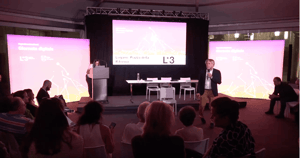In his speech on the 2019 Digital Day, the sociologist Francesco Morace discussed two key aspects of the age we are living in: the relationship between ethics and the digital world, and new perspectives with the increasingly widespread use of Artificial Intelligence.
According to Morace, ethics and the digital world appear to be worlds apart, but there are a number of points where they may cross over.
In the digital era we are experiencing a change from the bottom up, which is radically changing our awareness and is affecting all generations, making us review our beliefs system, our priorities, our behavior and our moral choices.
It is no coincidence that people are talking about paradigm shifts, and Morace identifies four of them in particular:
Trust&Sharing: true life, relationships of trust, deep feelings
Today it is easy for us to share our experiences without it costing us anything. We do it to be acknowledged and to acknowledge others. The element of sharing has been the driving force behind the mechanism of being online. Our reputation and our credibility (trust) play a key role in our being online and are the basis on which things happen – a mechanism capable of balancing the information overload, making us distinguish between what is relevant and what is not.
Unique&Universal: personal tastes, specific circumstances of different regions
This paradigm overturns the vulgate of globalization. As soon as you tap into the “genius loci” and you think locally, you have to accept the challenge of a global view because people may see things differently from you. If you have a very strong local identity, you have to understand that it is by going outside, by mixing, that you can make your identity stronger. As people, as a community and as nations we have to accept the challenge presented by change.
Quick&Deep: timeliness and quality of services
It is important to not confuse information with knowledge: knowing is not the mere result of combining news and ideas, but a complex process in which the ability to choose, select and understand what is going in one direction or in another plays a part. Today timeliness must be matched with the ability to build something deep. We will go back to reasoning in terms of the ability to last: the things that are of value are those that will remain – those that have an ability to mature.
Crucial&Sustainable: transparency of processes and their traceability
We always have to remember that we have to guarantee sustainability. Doing business today first and foremost means respecting people: those that live in the community in which you work and those that work for you. The road we are heading towards is that of a reputation economy.
Having defined this new reference system, we can openly and confidently look at the advent of Artificial Intelligence. In this respect we also need to overturn a fear that is as widespread as it is understandable: that machines will end up being superior to us and will replace human beings.
It is obvious that in a closed system with precise rules and goals in which computing power and memory capacity are used extensively, machines will do better than us. But this is not a problem. Even machine learning – the amazing ability of machines to learn from themselves – must not mislead us: machines learn through a series of instructions they have received from us.
What has just been described is only one aspect of intelligence, and it may also perhaps be wrong to even call it Artificial Intelligence, because in some ways it makes us think that all human intelligence can be replaced.
In fact, we still only have a vague understanding of how our brain works. We still don’t know how some things work, such as intuition, mirror neurons and the fact that we are social animals. We have the ability to empathize, something that a machine can never do, we act on reasoning, such as hope, something that is not only completely imaginary, but also a very powerful lever…
These characteristics that we have ought to reassure us and not make us fear that Artificial Intelligence will erode our human dignity. Actually, these days we have the unique opportunity to develop a higher level of ethics, which means making work more dignified (because the work being replaced is usually the most humble kind), developing new skills and reinforcing those that we already have: imagination, intuition, care….
We can rediscover all these elements and enhance them through Artificial Intelligence. What is important is that we try to have a better understanding of how powerful human intelligence is by constantly comparing it with the artificial kind: in this regard we should work on the subject of responsibility, experimentation, decision-making and intellect.
According to Morace’s humanistic view, we ought to focus on the things that machines will never be able to do. For example, anything that has to do generosity, unexpected repayment and the power of acknowledgement – factors that cannot be attributed to a classic economic value, but on which social living is based.
In the next decades reasoning will be key. And we will discover that it is in fact the unlikely factor, the one that algorithms have difficulty capturing, that will be the one to change the world.

